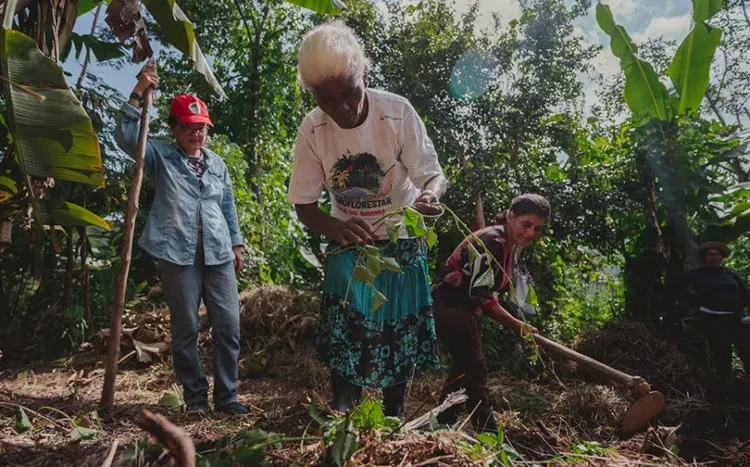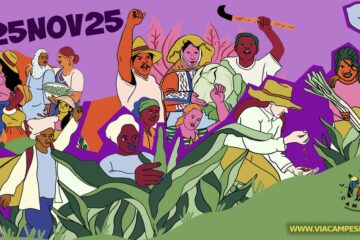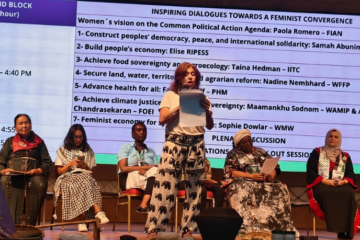So far this century, in Latin America we have gone from building unprecedented processes of transformation and change to facing very harsh moments of regression and destruction. Feminist economy in our region has grown and consolidated a systemic vision, confronting this reality and contributing to the generation of thought and movement, of multiple initiatives both of resistance and of alternatives. Thus, when we speak of women and feminist economy, we are not speaking of a sector, of a portion of something, but of the system as a whole.
In this systemic vision that we have cultivated, the notion of life as central becomes clear — an expanded notion of life. We understand life as an integral system and as an analytical category that refers to material and relational dimensions, in turn the axis of the economy. It is an integral system of which we are part, where we are interdependent and where flows of care are essential, as are the principles of diversity, collaboration, and complementarity. Life implies co-evolution, a complex dynamic of conditions that have been created and recreated throughout history.
Along this path, women have played fundamental roles that are now recognized and emerging, but that for a long time were devalued or unacknowledged. Care and reproductive work, agriculture, and rituality, for example, express this relationship between nature and women’s knowledge in the processes of life. By placing this perspective at the forefront, it becomes necessary to rethink the relationship between culture and nature, which is one of the key dimensions in interpretations of sex–gender systems.
From a more Western feminist perspective, one of the postulates was to dissociate women from nature in order to show that both sex and gender are cultural constructions. Politically and analytically, this is important and continues to be a key tool. But at the same time, in these years we have made a rereading in the sense that nature is not an externality, not something “out there” while human beings are “over here.” Being part of it, we see how nature is a co-construction of life. In it, women are nature. We must reveal this, not in the fundamentalist sense of assigning ourselves roles, but in the sense of the depth of this work, rituality, poetry, of everything historically involved in co-creating and sustaining nature — and now, in the challenge of recovering and restoring nature.
There are other matters to rethink, re-discuss, and nurture with the wealth of collective experiences and reflections. One of the fundamental questions in the development of feminist economy in these years has been identifying the phenomenon of the commodification of life. Here I want to bring in the ever-living memory of Nalu Faria, with whom, at the beginning of the century, we took on this question. To speak of decommodification, we must understand how commodification has occurred, how far it has gone, and in what ways it is a threat.
What processes have led to commodification? And how are we going to dismantle it?
The imposition of a total market in Latin America took place through neoliberal adjustments, in which processes of generating goods and services and conditions of life were gradually co-opted and absorbed by the market system. The economy is not only what is monetized or commodified. Economy is the broad set of production, reproduction, services, relationships, with or without money involved. It is the creation not only of commodities, but also of goods and relationships, of conditions of life.
One of the cornerstones of feminist economy is recognizing the whole and the interrelations between the commodified economy and the other economies that take different forms in our countries. In Latin America and Africa, the capitalist system seeks to hegemonize and dominate other forms of production, property, and community and neighborhood relations. From within these practices, where women are the majority, we can envision the possibility of transforming the system.
We believe that a key to decommodification lies precisely in what already exists — that is, practices and relations that differ from capitalism. Even if dominated and subordinated, they resist. Preserving them is not only essential in the immediate term, to generate care with broad reach, but it is also the key to transition. We can only transition to something else if we manage today to preserve, control, and expand possibilities of production and reproduction. If we lose that, how will we transition? How do we confront the universal oligarchic powers that now dominate us?
The magnitude of power now unfolding is immense and leaves us almost disoriented. But from where else can we transform, if not from what we can control in terms of generating conditions of life?
The commodification we have experienced in these decades has sought to erase diverse forms of work and to internalize visions such as that of so-called women’s empowerment. What we find now is that even neoliberal feminist visions have spread — something that at the beginning of the century seemed impossible. The system sells us the idea that in order to overcome domination we must enter the capitalist market, have jobs and income under the scheme of wage labor relations, as the key to our emancipation. Many times, this does not mean moving from economic “inactivity” to “activity,” but substituting previous forms of work and production. For example, when a woman leaves family and peasant economy for a supermarket sales job, her previous forms of production, wisdom, and knowledge are erased.
The attack on economic diversity and the imposition of aspirations for a single model of capitalist economy is another challenge. How do we envision dignified work with rights within formulas of economic diversity? How do we generate other conditions in places where there is neither employment nor formal social protection? It is a challenge for us and for public policy to develop alternative proposals, expanding definitions of rights toward different social and economic realities.
The commodification of life has precisely meant turning needs into commodities. How do I satisfy my need? By having money to buy a commodity. That is the vision being advanced, and needs as rights become distorted. More than 70 years ago, Eva Perón formulated the postulate: “Where there is a need, a right is born.” That principle, so forward-looking in her time, even ahead of United Nations discourse, is not by chance now attacked by Milei. Ultimately, a whole set of corporate power mechanisms has been constructed, internalizing a vision, values, and practices for the process of commodification.
The concentration of capital and wealth at unprecedented levels illustrates the reach of neoliberalism in Latin America. This is directly linked to the expansion of entrepreneurial logic as the optimal model for the economy and society, a phenomenon pushed globally through different channels. Retrospective and historical analyses show how the United States constructed the idea of the enterprise as the key, as the optimal cell of society. The flipside was the destruction of diverse forms of property, production, and labor, projecting the notion that what is good is what belongs to the market. The expansion of the market into the reproduction of life represents a capture of the very question of how needs are to be satisfied.
Many years ago, when issues of households, domestic work, and food were being debated, there was talk of the dream of a “kitchenless” house, seen as the stronghold of oppression of women condemned to cook. Having a house without a kitchen was liberating. Now that dream can become reality, but through the capture of the market, through extreme commodification. Everything is in dispute. It is striking how the market has been able to capture certain formulations that arose from an anti-systemic vision, reframe them, and give us another, terrible perspective.
Another relevant element is the plundering of resources and the siege on rights and living conditions in impoverished populations. The process we have lived through in recent decades gives rise to mass exoduses, critical migration phenomena, and the escalation of mafia economies. All of this follows a business logic, one of the deterioration of notions of life and society, of uprooting and restructuring subjectivity.
At the same time, and in the face of these dominant trends, the progressive experiences we lived in recent decades have left us a legacy of practices. From feminist economy, we faced the challenge of broadening our analyses and proposals to position life as the axis of all macroeconomic, sectoral, and local policies.
In what we can call the “progressive decades,” we came to propose another system, envisioning “Buen Vivir (“Good Living”) as an alternative system. In the Ecuadorian case, in economic terms this was expressed as a social and solidarity economic system. These were enormously important steps for experiences that were, at that moment, articulating in networks of social and solidarity economy, cooperatives, food sovereignty. All of this had a moment of confluence in public policy, in proposals, in constitutions — and it is a legacy we cannot abandon, that we must hold onto as a shield against the current attacks, positioning it as a possibility for the future.
What agenda will help us navigate these turbulent waters?
A first element has to do with projecting an economy of expanded reproduction of life, in contrast to the expanded reproduction of capital. That implies redefining the productive and energy matrix, eliminating extractivism, exploitation, inequalities, and destruction. These are questions of scale. Sometimes alternative economies remain very tied to micro terms — community, local — but we must see things at global, regional, national levels. Small solutions, if projected as aggregated, can promote change.
Of course, we must defend the care economy — but not commodified. The care economy has already crossed a threshold of recognition; to a large extent, visibility has been gained. The issue is how to project and consolidate it in non-commodified terms. A very important matter is the defense of the State and of the public sphere, which is the condition for recognition, redistribution, and the exercise of rights. If the public sphere is destroyed, our notion of vindicating and guaranteeing rights has no reference. We cannot retreat into notions of community alone — which, like everything else, are also being captured. What community are we talking about? With what scope? How do we differentiate ourselves from captured communities?
We need a different vision of economic empowerment, one that is not anchored to integration into the market. For this, visibility and recognition of what women have historically contributed, what we do, and its transformative potential, is essential.
Feminist economy has grown and holds the potential to converge in the search for building alternative systems — a capacity rooted in lived experience. We, as women, practice economy differently, with a distinct background and knowledge. We have a vast agenda ahead of us for rereading, reinterpreting, and collectively reflecting on key issues to advance our agenda. Otherwise, we sometimes feel as though we remain on the same ground. This is a moment to take a qualitative leap and move further forward.
Magdalena León is a feminist economist and a member of the Women Transforming the Economy Network (Remte) in Ecuador. This article is an edited transcript of her presentation during the webinar “Building Proposals for Feminist Economy and Environmental Justice,” organized by Friends of the Earth International, the World March of Women, Capire, and Real World Radio on July 15, 2025.




